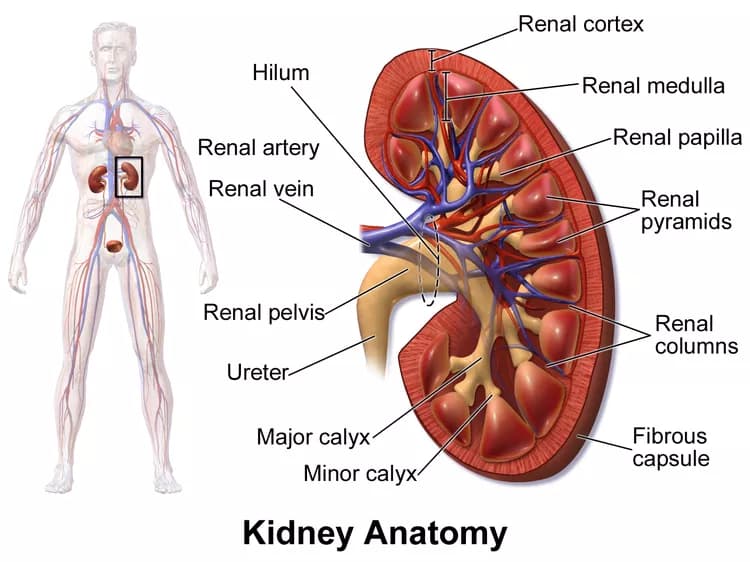
Breathing Dirty Air May Harm Kidneys
Outdoor air pollution has long been linked to major health conditions such as heart disease, stroke, cancer, asthma and chronic obstructive pulmonary disease. A new study now adds kidney disease to the list, according to researchers at Washington University School of Medicine in St. Louis and the Veterans Affairs (VA) St. Louis Health Care System.
Pollution may increase the risk of chronic kidney disease and, ultimately, contribute to kidney failure, according to the researchers.
The Washington University team, in collaboration with scientists at the Veterans Affairs' Clinical Epidemiology Center, culled national VA databases to evaluate the effects of air pollution and kidney disease on nearly 2.5 million people over a period of 8.5 years, beginning in 2004. The scientists compared VA data on kidney function to air-quality levels collected by the Environmental Protection Agency (EPA) as well as the National Aeronautics and Space Administration (NASA).
The EPA derived its data from land-based air-monitoring stations across the U.S. The findings suggest that 44,793 new cases of kidney disease and 2,438 new cases of kidney failure may be attributed to levels of air pollution that exceed the EPA's threshold of 12 micrograms per cubic meter of air, which is the highest level of air pollution considered safe for the public, as set by the Clean Air Act of 1990 and updated in 2012.
The study is published Sept. 21 in the Journal of the American Society of Nephrology.
"Data on the relationship between air pollution and kidney disease in humans has been scarce," said Ziyad Al-Aly, MD, the study's senior author and an assistant professor of medicine at Washington University. "However, once we analyzed the data, the link between air pollution and the development of kidney disease was clear."
Fine particles can damage the kidneys in the same way they damage other organs such as the heart and lungs. Airborne and invisible, microscopic pieces of dust, dirt, smoke, soot and liquid droplets often become destructive when they invade the bloodstream. The kidneys filter the blood, and these harmful particles can disrupt normal kidney function.
The study found that even low levels of particulate matter may adversely affect the kidneys. And those adverse effects increase as pollution levels increase.
"The higher the levels of air pollution, the worse it is for the kidneys," said Al-Aly, who is also the VA's director of clinical epidemiology in St. Louis. "However, no level is completely safe. Even at relatively low levels, there was a relationship between particulate matter concentrations below the EPA thresholds and kidney disease."
Researchers also linked the VA data to space-borne sensors from NASA satellites. "NASA data and EPA data yielded consistent results," Al-Aly said.
"The beauty of using both EPA and NASA data is that the agencies used two distinct techniques for collecting data, yet the results were similar," he said. "This constellation of findings suggests that chronic exposure to air pollution is a significant risk factor for the development and progression of kidney disease."
Study results placed Southern California and large regions in the South, Midwest and Northeast at the greatest risk for kidney decline attributed to air pollution.
Over the years, unsafe levels of outdoor air pollution have decreased in the U.S. Still, more than half of the U.S. population lives in areas -- from industrialized big cities to farming communities to coal-mining towns -- with unhealthy levels of outdoor air pollution, according to a 2016 study by the American Lung Association.
In many places across the globe, including China and India, outdoor air pollution is significantly worse than in the U.S.
"In our analyses, the risk of chronic kidney disease and its progression was most pronounced at the highest levels of fine particulate matter concentration," Al-Aly said. "This suggests further study is needed for a broader assessment of the global burden of kidney disease attributable to air pollution."
Materials provided by Washington University in St. Louis. Original written by Kristina Sauerwein. Note: Content may be edited for style and length.
Disclaimer: DoveMed is not responsible for the accuracy of the adapted version of news releases posted to DoveMed by contributing universities and institutions.
References:
Benjamin Bowe, Yan Xie, Tingting Li, Yan Yan, Hong Xian, Ziyad Al-Aly. (2017). Particulate Matter Air Pollution and the Risk of Incident CKD and Progression to ESRD. Journal of the American Society of Nephrology. DOI: 10.1681/ASN.2017030253
Related Articles
Test Your Knowledge
Asked by users
Related Centers
Related Specialties
Related Physicians
Related Procedures
Related Resources
Join DoveHubs
and connect with fellow professionals

0 Comments
Please log in to post a comment.